#characterization
Text
i feel like duke would be seen as a mediator a lot for problems but he’s secretly creating some of them cause he’s bored/petty/vengeful
like oh, tim took too long getting into his suit resulting in condiment king spraying duke with ketchup, so suddenly his laptop was plucked of its stickers, he of course assumes it was jason or stephanie
or when dick knowingly came over when he knew he was sick, resulting in duke missing out on a field trip due to a 24 hour cold, so suddenly the patrol schedule never got to dick on time, making him think bruce was being prickly again, forcing him over to the manor more
one day when he’s bored he places clues and riddles all around the mansion all leading to either dead ends or starts to other riddles, just to see what they would do
i need more petty duke LMFAO
#duke thomas#dc headcanon#characterization#signal#dc signal#dc comics#batman#dc#batfamily#petty duke thomas#tim drake#dick grayson#jason todd#damian wayne#batbros#dc robin#bruce wayne#stephanie brown
132 notes
·
View notes
Text
I have been doing so much reading on ao3 lately and have come to realization conner has to be one of my favorite superman characters of all time.
Not only is there so much to break down from his character but he's so wildly different that I love it.
It's also kinda sad but also refreshing to see superman so outta his depth about the fact he has a half son with lex luthor of all people.
It's honestly really sad to see the fact he doesn't actually know how to handle conner though. Like Kal just happens to be disturbed by him and it causes a rift between them that can't be mended. Of course it's not Conners faults but the fact he has no idea what to do to make superman like him kills him on the inside but he tries to still do right and make him proud.
It's honestly so sweet and yet so sad at the same time. Which is why I love that he has the young justice league and his boyfriend to always support him. It really seems like we glazed over their relationship and don't do any real development which is a blessing as it is a curse.
Honestly I love seeing where superman kinda just accepts him and acts like a divorced parent sharing custody but I just absolutely with all my heart LOVE when we get to see more break down fics of their relationship and the seems of what makes Conner and Clark's bond.
I'm only updating this because so I could say in other words this:
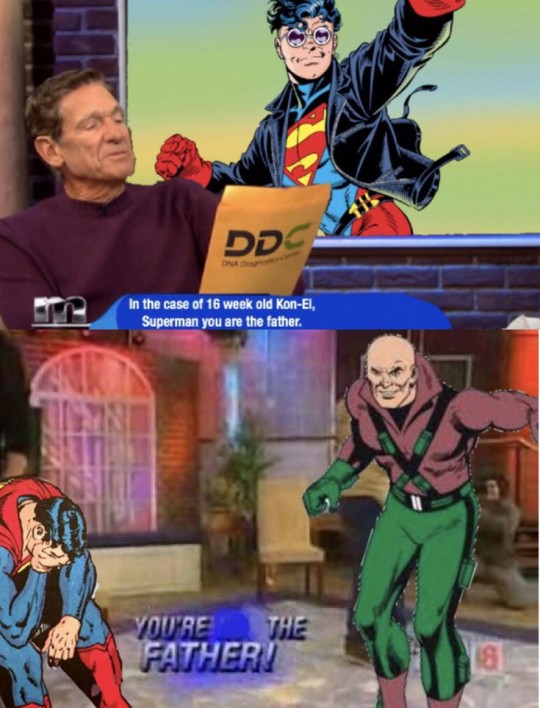
#they are so silly#batman#supersons#dc comics#superhero#superman#breaking down characters#characterization#development#angst with a happy ending#conner kent x tim drake#teach me how to dougie#once again the chat is tweakin#clark kent#kal el#conner kent#kon el superboy#kon el kent#timcon#tim x conner
26 notes
·
View notes
Text
god 1x04-1x06 re: callum's impulse control ("i was just trying to scare her, i thought she'd back down" → wanting the nova blade; "you want to know why he's called bait?" "not really" "well i'm gonna tell you anyway" → all of 5x08 down to rayla being bait / doing dark magic again even after being told repeatedly not to; "this path is too easy" "no it's not, it's the exact right amount of easy" → "what if i'm on a path of darkness?" "then take another path, dummy?" + dark magic vs primal magic). arc setup for ages
#1x04-1x06 the foundational eps i love you So Much#tdp callum#s5#s1#multi#parallels#mine#foreshadowing#characterization#don't even talk to me about the 'that went well! they tried to kill me' + 'alright enough almost killing me' foreshadowing#the boat!!#tdp#the dragon prince#callum
25 notes
·
View notes
Text
I love the "came back wrong" trope but from the opposite side.
Imagine you are dead. And then you are RIPPED from the embrace of decay into the world of the living again. Your memories are hazy and you don't recognize any of these people, but they act like they're close to you? Like they love you? So you try to get your memories back, to act like you belong here, but everybody tries to forget you died. And you can't. It is omnipresent. And just trying to grapple with that fact pushes the people who "love" you away, and they're incapable of understanding, and they're so confused, what's wrong N̶̄̀O̶͛͗T̷̉́ ̷͋͝Y̴̎̌Ȍ̴̈U̸̓R NÄM̴̃͑E̵̾̇? And you just need them to understand, you aren't that person! You aren't! You don't know who that person is! You don't know why any of this is happening, but they're unwilling to bend, they keep insisting you are that person, your memories will come back, everything will be normal again, and you want to scream and cry and claw yourself open to show them you're different. Your existence as a being wholly separate from whoever you "used to be" is a sin unto itself. All you can do is scrabble for life and to them, you're killing whoever they loved to do it.
just. lots of fun in that concept, you know?
#writing#media#tropes#characterization#character dynamics#came back wrong#kiriona gaia#nona#alecto#tlt#the locked tomb#personal growth#trans#transgender#like the whole trope is very transgender#vulture chatter
61K notes
·
View notes
Text
Random thought this morning:
When doing characterization questions to try to build a character's personality--whether that's for fiction, an RPG, whatever? "Favorite" is often meaningless compared to "average".
It's very possible your character has a favorite food! But for most characters, a "favorite" food is.....nebulous. It may or may not tell you anything about them--if it does tell you something, it's probably something you already knew, and if it doesn't, then it falls flat and the question fails to do its job of actually helping you get to know this character better and making them feel like a person.
Something that's often more helpful is: What is their default option?
Your character walks into an unfamiliar tavern. What's their "safe" order? What's their default drive-through option? How, on a normal day, would they take their coffee? If they go to a normal bar with their friends on an average night, what do they have to drink? What do their pajamas look like?
Nine times out of ten, "my character's favorite color" is a nonsense question, but is there a color that dominates a lot of their wardrobe? (Using me in real life as an example here: My favorite color is earth-tone gold, but the vast majority of my clothes have a black base because it's more convenient--black doesn't clash with anything.)
Yeah, absolutely, have fun designing what they'd wear for a fancy ball--that's also great characterization! But what do they wear on an average day? Because by definition, that's who they are under normal circumstances. The best characterization question I've ever heard, genuinely, was "describe your character's shoes on a normal weekday".
That baseline will often reveal to you that your character does have a "favorite," and much more organically! It's much more important, when it comes to portraying a character consistently, to know who they are by default--and when you know that, you can poke at them and find the...dissatisfaction points, for lack of a better term. The places where the default feels just fine vs the places where you feel your character would want something more when given the opportunity.
The "Well... she'd order venison stew and beer by default, because it's pretty hard to fuck that up and she's a pretty down-to-earth person, but I think she actually really enjoys delicate aromatic spices...when they're in big cities with real restaurants, she probably spends a decent amount of her personal funds on nice food when she has the opportunity" feeling often does a LOT more to spark an understanding of a nuanced character than going straight for trying to define a Favorite Food out of the blue.
675 notes
·
View notes
Text
What Makes an Ethnic Villain "Ethnic" or "Villainous?" How Do You Offset it?
anonymous asked:
Hello WWC! I have a question about the antagonist of my story. She is (currently) Japanese, and I want to make sure I’m writing her in a way that doesn’t associates [sic] her being Asian with being villainous.
The story is set in modern day USA, this character is effectively immortal. She was a samurai who lost loved ones due to failure in combat, and this becomes her character[sic] motivation (portrayed sympathetically to the audience). This story explores many different time periods and how women have shown valor throughout history. The age of the samurai (and the real and legendary female warriors from it) have interested me the most, which is why I want her to be from this period.
The outfit she wears while fighting is based on samurai armor, and she wears modern and traditional Japanese fashion depending on the occasion. She acts pretty similar to modern day people, though more cynical and obsessed with her loss. She’s been able to adapt with the times but still highly values and cherishes her past.
She is the only Asian main character, but I plan to make a supportive Japanese side character. She’s a history teacher who knows about the villain and gives the protagonists information to help them, but isn’t involved in the main plot otherwise.
Are the way I’m writing this villain and the inclusion of a non-antagonist Japanese character enough to prevent a harmful reading of the story, or is there more I should do?
Why Does Your Villain Exist?
This makes me feel old because David Anders plays a villain with this kind of backstory in the series Heroes starring Masi Oka.
I think you want to think about what you mean when you say:
Villainous (In what way? To whom? To what end?)
Harmful (What tropes, narratives and implications are present?)
I’m relatively infamous in the mod circle for not caring too much about dimensions of “harm”. The concept is relative and varies widely between people and cultures. I don’t see much value in framing motivations around “What is less harmful?” I think for me, what matters more is:
“What is more true?”
“Are characteristics viewed as intrinsic to background, or the product of experiences and personal autonomy?”
“Will your portrayal resonate with a large audience?”
“What will resonate with the members of the audience who share the backgrounds your characters have?”
This post offers additional questions you could ask yourself instead of “is this okay/not okay/harmful.”
You could write a story where your antagonist is sly, sadistic, violent and cold-blooded. It may not be an interpretation that will make many Japanese from combat backgrounds feel seen or heard, but it’s not without precedent. These tropes have been weaponized against people of Japanese descent (Like Nikkei Japanese interned during World War II), but Japan also brutalized a good chunk of Asia during World War II. See Herge’s Tintin and The Blue Lotus for an example of a comic that accurately showcases the brutality of Japan’s colonization of Manchuria, but also is racist in terms of how Japanese characters are portrayed (CW: genocide, war, imperialism, racism).
You could also write a story where your character’s grief gives way to despair, and fuels their combat such that they are seen as calculating, frigid and deeply driven by revenge/ violence. This might make sense. It’s also been done to death for Japanese female warriors, though (See “Lady Snowblood” by Kazuo Koike and Kazuo Kamimura here, CW: sexual assault, violence, murder and a host of other dark things you’d expect in a revenge story).
You could further write a story where your antagonist is not necessarily villainous, but the perceived harm comes from fetishizing/ exoticizing elements in how her appearance is presented or how she is sexualized, which is a common problem for Japanese female characters.
My vote always goes to the most interesting story or character. I don’t see any benefit to writing from a defensive position. This is where I'll point out that, culturally, I can't picture a Japanese character viewing immortality as anything other than a curse. Many cultures in Japan are largely defined by transience and the understanding that many things naturally decay, die, and change form.
There are a lot of ways you could conceivably cause harm, but I’d rather hear about what the point of this character is given the dilemma of their position.
What is her purpose for the plot?
How is she designed to make the reader feel?
What literary devices are relevant to her portrayal?
(Arbitrarily, you can always add more than 1 extra Japanese character. I think you might put less pressure on yourself with this character’s portrayal if you have more Japanese characters to practice with in general.)
- Marika.
When Off-Setting: Aim for Average
Seconding the above with regards to this villainess’s story and your motivations for this character, but regardless of her story I think it’s also important to look specifically at how the Japanese teacher character provides contrast.
I agree with the choice to make her a regular person and not a superhero. Otherwise, your one Asian character is aggressively Asian-themed in a stereotypical Cool Japan way (particularly if her villain suit is samurai-themed & she wears wafu clothing every so often). Adding a chill person who happens to be Japanese and doesn’t have some kind of ninja or kitsune motif will be a breath of fresh air (well, more like a sigh of relief) for Japanese readers.
A note on characterization—while our standard advice for “offset” characters is to give your offset character the opposite of the personality trait you’re trying to balance, in this case you might want to avoid opposites. You have a villainess who is a cold, tough “don’t need no man” type. Making the teacher mild-mannered, helpful, and accomodating would balance out the villainess’s traits, but you’ll end up swinging to the other side of the pendulum towards the Submissive Asian stereotype depending on execution. If avoiding stereotypes is a concern, I suggest picking something outside of that spectrum of gentleness to violence and making her really boring or really weird or really nerdy or a jock gym teacher or…something. You’re the author.
Similarly, while the villainess is very traditionally Japanese in her motifs and backstory, don’t make the teacher go aggressively in either direction—give her a nice balance of modern vs. traditional, Japanese vs. Western sensibilities as far as her looks, dress, interests, values, etc. Because at the end of the day, that’s most modern Japanese people.
Sometimes, the most difficult representation of a character of color is making a character who is really average, typical, modern, and boring.
- Rina
#writeblr#Japanese#Japanese women#Villain#antagonist#tokenism#characterization#representation#stereotypes#immortality#superheroes#supervillains#asks
485 notes
·
View notes
Text
After finishing Dungeon Meshi, I had a lot of thoughts. Most of them were thoughts I'd seen echoed by other people, but there's one thing I don't think I've seen anyone else say:
Everyone hates Laios.
Obviously Kabru makes hating Laios his whole personality for a while, and the western elves think he'd be a dreadful dungeon master Lord of the Dungeon, and half of his party gets annoyed by his enthusiasm for monster cuisine. But I'm not talking about that.
Let's start with how almost literally everyone thinks he'd be the worst possible Lord of the Dungeon.
(cut this down)

This isn't just Kabru being in his "hating Laios is my entire personality" phase; everyone assumes that Laios's desires being fulfilled by the dungeon would be bad for humanity.
To be clear, they're wrong. Sure, Laios is susceptible to the Winged Lion's temptation, but so is everyone. At least Laios's stint as ersatz dungeon lord didn't have a body count! (Unless you count the Winged Lion's clones.)
But that doesn't matter, does it? People hated him before he reveals his obsession with monsters, and they have no shortage of reasons. Laios keeps talking about monsters and asking unwanted questions, he can't hold a normal conversation, he can't read the room or understand social cues, he doesn't fit in anywhere.
Laios does his best to act normal (most obviously when he pretends not to notice the Golden Country spirit because no one else sees it), but it's not good enough. People can still tell that he's different. They hate him when he acts weird and they hate him when he acts normal. Don't take it from me; take it from Chilchuck.

The left panel is the whole reason this post exists. It states in plain English that Laios would still be ostracized even if he only said "reasonable" things. People's distaste and distrust of him isn't rooted in how he acts or what he says, but in who he is.
...
Pretty much anyone who knows what they're talking about accepts that Laios is autistic. Probably also Falin, maybe also other party members, but Laios is definitely the poster boy for Dunmeshi autism. And the reasons people hate him are pretty closely aligned with his autism. That's usually subtext, but Shuro says the quiet part out loud.
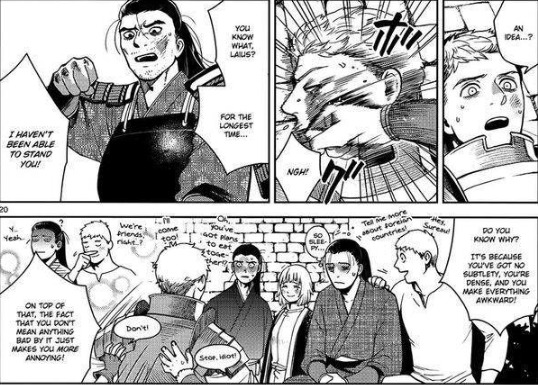
Shuro doesn't know about the monster-eating or think Laios is gonna destroy humanity. He just can't stand Laios's eccentricities. And he's far from alone.
We don't see a lot of Laios's childhood, outside his interactions with Falin...but the subtext isn't great. You don't need to be a seasoned dungeoneer to recognize that someone is "different"; any kid can do it. And from the sparse glimpses we've seen of the Thorden parents—Laios's nightmare, the little indications that he shaves to avoid looking like his father, etc—they don't seem to have accepted their son's differences, either.
I doubt anyone in the Dungeon Meshi world knows the word "autism". If you tried to explain it to the Thorden party, their reactions would probably range from "Are you sure that's a thing?" to "Come on, everyone thinks like that sometimes, right?" But you don't need words to recognize difference, or to loathe it, or to make different people's lives hell. To make them want to escape their lives, by whatever means are necessary.

Is it any wonder Laios identifies with monsters, when so many people already treat him like one?
233 notes
·
View notes
Text
It occurred to me recently that I've never shared the headcanons I had regarding Mario's strength in my version, so I thought I'd list them out in a single post for you guys.
Enjoy! :D
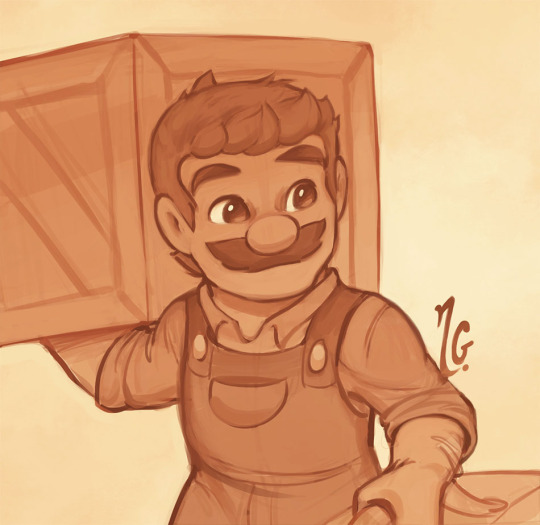
- Even without power-up, Mario is stronger and notably more resistant than average.
- This is mainly due to his high muscle density. He has a considerable body mass and is surprisingly heavy despite his short stature.
- He has a very healthy heart and incredible cardio. Sustained efforts that would leave others winded will affect him a lot less.
- His sturdiness gives him great equilibrium and stability, allowing him to keep his footing even on unsteady terrain.
- The man can lift objects up to five times his size and can pull tremendous loads across a short distance.
- He can carry the equivalent of a person's weight for long periods of time without feeling strained or tired.
- He makes labor look deceivingly easy to the point that others constantly underestimate how hard it truly is (and are always astounded when they try it for themselves, only to fail miserably).
- Mario doesn't workout outside of his daily tasks and activities. His job and naturally active disposition are his only form of exercise.
- He sometimes forgets how physically powerful he actually is, and has warped/broken quite a few things by accident.
- He is however extremely mindful of his capabilities when surrounded by others, and always significantly tempers himself when playing or interacting with friends.
- He never uses his strength to its full extent; both because he doesn't need to and because he fears causing harm otherwise.
- His intervention on a rampaging chain chomp was the greatest demonstration of brute force anyone had ever seen in the whole Kingdom. (See here for context)
- The exploit has made him famous among the guards and citizens alike, earning him the prestigious title of "Super" for the first time.
- While not typically one to show off, Mario loves entertaining people through various feats of athletic prowess.
- Out of all the things others seek his help for, he feels most useful when the favor requires either heavy lifting or manual expertise.
- Albeit very efficient when doing more dynamic chores, his prefered way of working is with his hands only.
- He can punch through almost any surface except literal stone and can bend even solid metal out of shape.
- A rush of adrenaline will cause his endurance to skyrocket, making him temporarily able to endure abject levels of pain and exhaustion.
- Despite those physical advantages, he values qualities of the mind and heart a lot more.
- When asked, Mario always says: "My brother and my friends give me strength. I owe them everything."
•°•°•
(There! Feel free to add your own if you have thoughts on those or feel inspired! ^-^)
#The best term I can use to describe how I picture Mario's strength in my AU is ''gentle and effortless'' 💞#He has a lot of muscle power - but it's soft and considerate just like him 😊#Mario#headcanon#personal portrayal#characterization#character traits#personality#physical abilities#Super Mario bros#fanart
436 notes
·
View notes
Text
Are your characters too “perfect”? Struggling to give them negative traits?
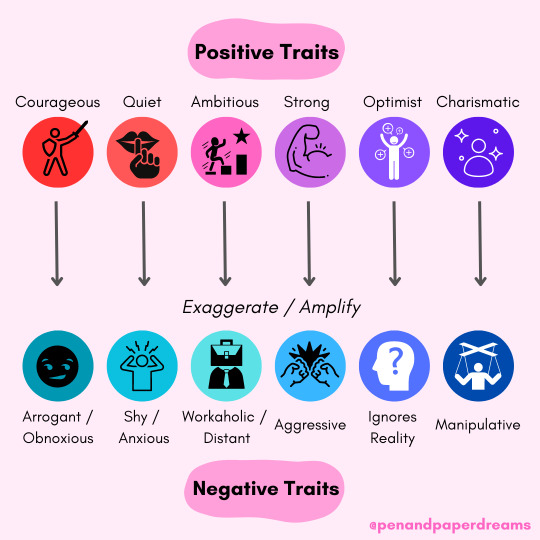
I’ve definitely fallen into the trap of making my protagonists and side characters too “perfect” before. It’s an easy mistake to make, but it can lead to your characters feeling one-dimensional if you’re too afraid to make them seem morally grey.
Here’s a very simple method:
1. Take a character’s main positive trait. Let’s take Hermione Granger, for example - her intelligence is a defining aspect of her character.
2. Exaggerate it into a negative trait. In the instance of Hermione Granger, she can come across to the other characters as a know-it-all. She’s not always portrayed as perfect for her intelligence, which is what makes her character more interesting.
Using this method, we have a number of options for negative traits for an intelligent character - patronising, arrogant, smug - to name a few.
I use the Fatal Attraction theory for this, which suggests that we fall out of love with someone for the same reason we were initially attracted to them. So, if you grew to like someone because you liked how strong and dominant they are, you may become tired of that down the line when their behaviour is controlling.
I’ve illustrated a few examples for how to exaggerate common positive traits into negative ones in the image above, but I have a few more examples to share so you really get the idea:
1. Comic relief / funny - can’t be serious, humour as a coping mechanism
2. Dark and mysterious - emotionally distant
3. Creative - aloof
4. Loyal - neglects own needs, willing to hurt for those they love
5. Compassionate / empathetic - overstepping boundaries
6. Honesty - overly blunt
7. Responsible - too serious
8. Humility - lack of self-belief
9. Trusting - easy to manipulate, overshares personal information
10. Perceptive - rude
11. Flirtatious - inappropriate
12. Organised - controlling, “neat freak”
13. Easygoing - lack of care about serious matters
14. Flamboyant - can be too much for some
15. Spontaneous - puts self in danger
Of course, you don’t have to do this. You can just have a character be spiritual and creative without making them out-of-touch and aloof. It’s completely up to you!
Using a method such as this, even if you only apply it subtly, adds a touch of realism to your writing by making your characters feel more well-rounded. It means that their negative aspects are truly coming from a part of them, rather than selected at random and mashed together from a list online.
#writing#writing tips#writing advice#character design#character building#character traits#characterisation#characterization#characters#personality#character personality#writingblr#novel#novel writing
723 notes
·
View notes
Note
I love how Jake is unquestionably the leader when it comes to Animorphs business and Rachel is unquestionably the leader in social situations
It even goes beyond that! Because the team is that good at listening to and respecting each other. They're always listening to whichever teammate has the best strengths for the current situation.
Like you said, Rachel leads in social situations. She coordinates outfits (Erek in #27), ties bowties (the banquet in #21), and generally excels at talking their way into and out of situations (Zone 91 in #14, the hospital in #17, etc.)
Tobias leads any time the group is all flying — rescuing George Edleman in #17, the dogfight in #24 — and any time there's a battle in the wilderness because he directs troop movements from overhead (#13, #30, etc.)
Ax obviously leads in matters of technology (Bug fighter in #11, repair dock in #45, sario rips in the MMs), and andalite culture (#18, #38) even though he doesn't want to.
Cassie's in charge the moment the kids are in a new environment. She's leading the survival efforts in MM2, #25, #11, #4, #42, and every other time the setting gets dangerous.
Marco's role might be the subtlest. But IMHO, any time Marco's in charge, it's because Jake's fucking up. Marco's only real coup d'etat is when Jake spirals out in #31, but he also takes charge when Jake's panicking in #16 and #25, and he spends a lot of #50-54 informally leading to make up for Jake's unwellness.
#animorphs#animorphs meta#characterization#rachel berenson#tobias fangor#aximili esgarrouth isthill#cassie animorphs#marco animorphs#marco is the jesus of 'jesus take the wheel' on this team#there's probably a real term for that role but y'all know what i mean
841 notes
·
View notes
Text
how to write children's personalities
(this is part of my series, how to write children in fanfiction! feel free to check it out if you want more info like this!)
this is the main aspect of writing children that i see people mess up so often, especially in the fandoms i'm in (sanders sides and undertale). children are not adorable little noodles with no brains and no concept besides being cute and silly and crying. children are beings that are just as complex as adults, and they deserve personalities to match. this will make them way more interesting to read about! let's get started!
since there are so many aspects to personality to talk about and i don't want to sit here typing for ten years, we're going to do this guide a little differently. i'm going to divide these issues into archetypes, write a short description, and then make a list of do's and don't's for each one!
archetype one: the cute little baby
okay. babies are cute. we all know this, and i'm not saying it's a bad thing to make your babies cute. a lot of people love reading about moments with adorable little babies. but here are some ways to step this kind of thing up, and some things to avoid if you want to improve upon writing this archetype.
do's:
give the child character another archetype besides this one. though "cute" is the foundation for a lot of child characters, it's not a personality. and if a character is vital to your story, then it needs a personality. that's just a rule. you will read more about other archetypes further along in this post!
make the moments symbolic. though it doesn't seem like it from an outsider's perspective, basically everything a baby does is for a reason, and every action a baby makes can say something about their personality. if you want this baby's personality to be energetic and curious, have them crawl around and explore things, and laugh a lot, and babble. if you want this baby to be more sullen and shy, have them cry quietly instead of wailing, or have them squirm when being held by new people.
make the actions of the baby's guardians affect the mannerisms of the baby. babies act differently depending on how the people taking care of them act and react. for instance, if the baby's guardians are very busy people, then maybe have the baby cry very loudly whenever they want something, since they know that it's the only way to get the attention of their guardians. stuff like that can add depth to a character and to a general story.
don't's:
decide that the baby is cute and call it a day. sweet little babies are cool and all, but they get very boring to read about after a while. this can barely even be considered an archetype because of how bland it is when it's by itself.
keep this archetype around for too long. as babies turn into toddlers and then children, they don't act even remotely the same way. it's strange and off-putting to read about a seven year old acting like a two-year old, unless it's a very clear character choice that is a result of explicit actions and events.
make the baby know that it's cute. realistically, children don't understand the concept of cuteness until they're around toddler age. if then, you want to make the kid be like "i get what i want when i'm cute, so i'll act cute!", then sure, that's hilarious. but when they're two months old, they're not batting their eyelashes because that's their personality. they're batting their eyelashes because they got something in their eye. the main thing that makes a baby cute is that they don't know they're cute. they're just figuring out how to do ordinary things.
make everything a cute moment. while babies are awesome, raising them isn't always sunshine and rainbows. make the baby do something wildly chaotic, because babies do wildly chaotic things all the time. not only does this make things more realistic, but it makes things very interesting!
archetype two: the shy kid
as a former shy kid, i know good and well that these types of children exist, and they are very real and valid. however, there are certain ways i've seen them written that are just terrible because once again, this archetype cannot be considered a full personality on its own. let's get into the do's and don't's.
do's:
make their shyness a deliberate choice. kids aren't usually naturally shy. kids are usually more curious than cautious. is there a reason why the kid is shy? there doesn't have to be a reason why the kid is shy, but there could be a reason why the child is NOT outgoing/curious. try and give something like this some deliberate cause, instead of just making them shy so they can seem more precious and infantilized.
make their shyness manifest in diverse ways. not all shy kids cling to their guardian's leg and sit alone during recess. there are different ways to be shy. you can be aggressively shy, or fearfully shy, or shy due to general unwillingness to change.
make their shyness have realistic consequences. someone who's shy is probably not going to have many friends, if any. not all shy kids magically meet an extrovert who adopts them. someone who's shy probably has underdeveloped social skills, which can lead to them being less emotionally intelligent down the line. this makes the shy kid archetype a lot more three-dimensional than just a wet noodle of fear.
don't's:
infantilize shyness or treat it like it makes the kid some sweet, precious angel. not only is this very uncomfortable for shy people to read, but it's generally unrealistic. shyness doesn't affect how good or bad somebody is - it's a neutral trait.
use shyness as a tool to make characters seem younger. shyness does not indicate age. fear manifests in many different ways, and shyness is not the only way.
rely on cliches. not all shy people have the same journey, and the idea that a shy person becoming more outgoing is the "goal" is not only a bit offensive, but it's very cliche. shyness is not always an obstacle to be overcome.
archetype three: the happy-go-lucky kid
oftentimes, the reason why children characters are written into stories in the first place is to give a little bit of lightheartedness and innocence. to add a unique voice among all the cranky, stingy, burdened adults. but you have to be careful when writing this archetype. i personally really dislike this archetype as a whole, but i'm going to put personal feelings towards it aside because honestly, there's no valid reason to dislike it besides opinion.
do's:
give the kid a trademark. maybe this kid makes a lot of little jokes, or maybe they always see the best in a situation. give the kid one thing that makes them happy-go-lucky instead of just giving them everything because nobody is endlessly happy all the time in every way.
go deeper. while happiness is very often genuine, sometimes, it's a mask that hides something else. this can be an interesting way to sort of spice up your happy-go-lucky kid character. maybe the kid is hiding a big secret behind all those jokes.
don't's:
make the character always happy. while children tend to have simpler thoughts, they don't have simpler minds. this child needs to have thoughts, real, genuine thoughts that aren't just happy things.
see happy-go-lucky as a trait that is exclusive to children. comparing happiness to childhood and viewing them as the only places where the other can exist is just wrong, and it's kind of depressing. maybe give happy-go-lucky kid a happy-go-lucky adult to exchange jokes with!
---
those are the archetypes that i see a lot. but now, i'm going to suggest a few child character archetypes that i LOVE that i don't see enough in fics! feel free to use any of these that you like. alter them, combine them! these are, in my opinion, some of the most fun child character personalities!
the spoiled brat: "i want this, and that, and that, and- why aren't you giving it to me?? if you don't give me what i want, i'll tell on you!". spoiled brats are so fun to read and write about, especially when they have absolutely no reason to be spoiled given the current situation (think riches to rags). they've got everything, humor, angst, and best of all, lots of pockets for personality. think about why the child is spoiled. were they enabled by their guardians? did they grow up rich, with access to everything they wanted? think about whether you want the child to stay spoiled. does something change? do they learn how to improve their materialistic and selfish tendencies? there are so many opportunities to play with the personality of this child!
the know-it-all kid: while i do see a lot of know-it-all kids in media, oftentimes, they don't actually have personality besides bossiness and intelligence. i love know-it-all kids who have depth to them. kids who are constantly spouting information because of their sheer love to learn. kids who have one specific thing that they know everything about, so they never stop talking about it. kids who tell people what to do and act like they know best because they don't have a lot of control over anything at home, so they grasp at whatever control they can find elsewhere. i think this archetype could open up a lot of ideas for personality further down the line. it also has a lot of variety with humor and angst, and general depth.
the serious child: this is an archetype that i cannot get enough of. i love a child that doesn't think they're an adult, per se, and still enjoys kid things, but just has such a calm and regal air about them that isn't learned. it's just natural. think of the kid that doesn't really get excited about things conventionally, but you can tell they're happy by their faint smile. the kid that seems to live in slow motion, and doesn't mind this fact at all. the kid that sits alone at recess just because other kids scare the birds away, and they want to see how a bird acts when it doesn't think its being watched. i love kids who have poignant thoughts, because their thoughts are so creative and different from adult thoughts.
the adult-ified child: now this is another archetype i can't get enough of, but it's for a different reason. this child, on the other hand, does think that they're an adult for one reason or another. maybe their guardians forced them to grow up too quickly. maybe they just wanted to grow up quickly by themselves. but this child has thoughts that are too big for their little bodies. they explore things that aren't meant to be explored when their brains are still so small. they do everything too quickly, they stumble through life as if a clock is ticking somewhere. to me, they're just haunting to read about. it feels wrong and dangerous to just watch them do things that hurt them because they don't know any better, but they're on a page. nobody can stop them. it's just so tragic, i'm obsessed.
the prodigal child: this archetype isn't really as deep or detailed as the others, but i do appreciate it. this archetype is for a child who knew who they wanted to be from an early age. a child who wanders into a ballet class and finds out they're better than the ten year olds by the time they're five. this archetype often pairs really well with the know-it-all kid or the adult-ified child because usually, children don't experience what it's like to be the best at something until they're a lot older. this is just a really cool archetype when you aren't quite sure what to do with that main character's little sister.
the chaotic child: this archetype is so much fun to read and write, to be honest. this is a child that just does as they please, whether it's out of curiosity or for pure enjoyment. think of the crazy stories that your guardians have about you or your siblings being absolutely insane. scribbling in a book and then demanding that the library publish their version. trying to ride the dog like a horse. cutting up clothes in an attempt to be a fashion designer. this one is just plain fun!
---
now, there are so many more archetypes out there, but those are just my spotlights and recommendations! i hope after reading this, you feel more equipt to write child characters that have real, engaging, interesting personalities!
#not sanders sides#ez's writing#how to write children#how to write#writing#writing tips#writing guide#writing advice#writing resource#writing resources#personality#writing personality#do's and don't's#cliches#avoiding cliches#characterization#character concept#character tropes#character traits#character help
953 notes
·
View notes
Text
hey did you guys know that alfred and jason share a birthday on august 16th
so don’t think about how alfred finally found a good enough reason to celebrate on his birthday, only for it to be taken away
don’t think about alfred waking up every august 16th to an over excited child, bubbling about shared birthdays and wishes, now only to be met with the cold darkness of the early morning
don’t think about alfred now spending his birthday at a grave, dutifully cleaning the headstone of a child
#man :(#made myself sad god damnit#alfred pennyworth#jason todd#he was the happy robin and i won’t forget it#dc robin#dc comics#batman#dc#batfamily#dc jason todd#jason todd robin#sad headcanon#dc headcanon#characterization
117 notes
·
View notes
Text
One thing to keep in mind when writing dialogue is the age of the character. A common issue I see in stories written by adults is that children below a certain age will all sound like toddlers and above a certain age will all sound like adults, with nothing in between.
Your characters don't need to use hyper-contemporary slang, especially if you're writing something other than a contemporary story, but they should in some way reflect their age in the way they speak, whether it's through vocabulary, syntax, content, vulgarity, confidence, or any other aspects of dialogue.
If the reader can't tell the difference between the speaking styles of a 12-year-old, a 20-year-old, and a 50-year-old, your dialogue probably needs another look.
375 notes
·
View notes
Text
I am wondering if Janai will be put in a place of like, addressing her issues with hesitation and uncertainty. Not per se that it's a strict character flaw — she's compassionate and quite decisive when it matters, and her brother's foolhardy, absolute certainty is his undoing every time — but I do wonder if it in typical TDP fashion it's gonna come back and bite her in the ass (more than it already has, of course)




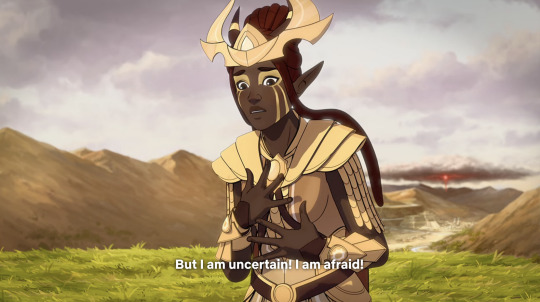
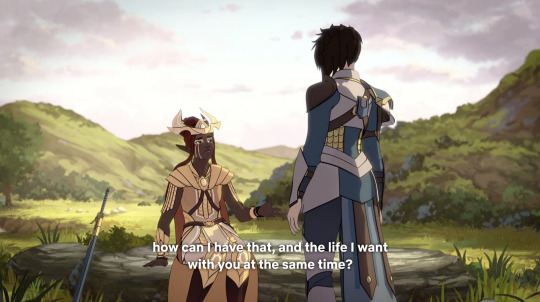

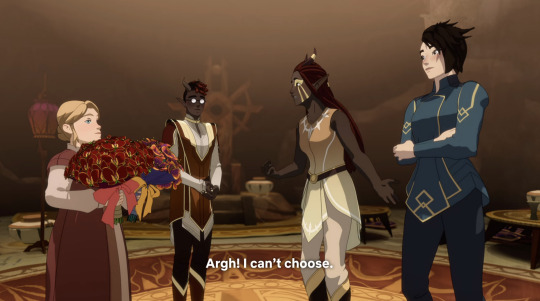

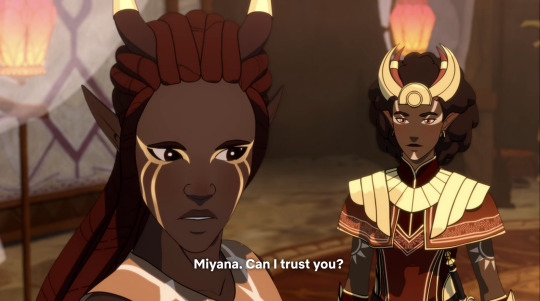
#tdp janai#janai#subset: choices#parallels#characterization#arc 2#of course she does choose to be queen and she does pick out wedding flowers#but. yeah#tdp#the dragon prince
36 notes
·
View notes
Text
Everyone Has Flaws
Flaws in characters are one of the most important parts of them. Flaws make a character interesting, give them depth, and make their job of propelling and driving the story a whole lot easier. My screenwriting prof’s biggest argument for thinking out your character’s flaw was, “why don’t they already have what they want?” It is a character’s flaw that keeps them from their goal, which creates the story of how they overcome it.
In this way, we don’t want to think about flaws as something you kind of tack on afterwards. A flaw should be created within the base of your character, driving and determining every aspect of their internal journey.
I’ve learned two ways to create flaws in character journey. They’re pretty similar, so I’ll try to explain simply.
Method 1: The flaw is in how they’re trying to reach their goal
Remember that characters have both a goal (internal, what they desire), and an objective (external, what they believe will give them what they desire). Boy wants to feel secure (goal), boy believes girl will validate him (objective), boy pursues girl. In this method, his flaw is in his thinking of how to reach his goal. Essentially, his objective is wrong, and he needs to realize it by the end of his arc.
So maybe the point of the story is that he should be finding internal security, or learn not to rely on others for his self worth. That would be his arc throughout the story.
Method 2: The flaw keeps them from their goal
This one is a touch simpler. Character A wants to belong somewhere but pushes away people when they get close. Flaw keeps character from their goal—it’s the reason they don’t have it already, and thus the thing they need to grow from to reach their goal in the end.
The reason they are the way they are tends to come from an event in their childhood or past. If Character A pushes people away, maybe it’s because the people who were meant to love them let them down, or they’re not used to people being genuine towards them, or they were bullied, etc. etc.
Of course, you could always try a mixture of both methods. The important part is that your character has something holding them back from what they want, because otherwise, why wouldn’t they already have it?
(More on creating characters here:)
#writing#creative writing#writers#screenwriting#writing community#writing inspiration#books#film#filmmaking#writing advice#characterization#character development#flaws#Everyone has flaws
472 notes
·
View notes
Text
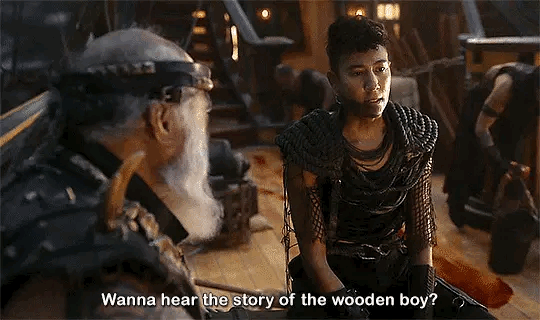
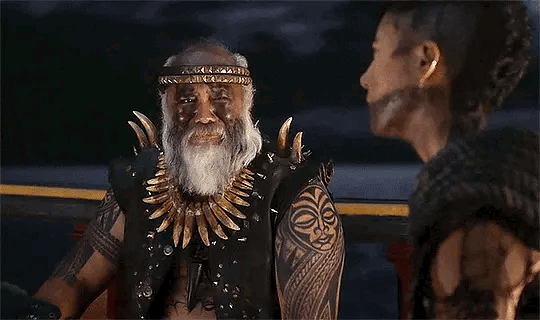
i absolutely love that jim is the one to keep the heart of stede’s crew alive while ed did everything he could to destroy it.
one of the first comments ed makes to stede’s crew in season 1 is “everyone’s covered in rope!” so what does jim do? literally covers themself in rope, to remind ed that, as long as they’re alive, that hope and love isn’t going anywhere.
not only that, but, in the bible, rope is a symbolism for trust and security. jim became a secure place for the crew to tie themselves to while just trying to stay alive.
of course, i then had to look into why they have a fishing net around their shoulders as well, and found The Fishing Net Parable from the Book of Matthew (13:47-52):
"Once again, the kingdom of heaven is like a net that was let down into the lake and caught all kinds of fish. When it was full, the fishermen pulled it up on the shore. Then they sat down and collected the good fish in baskets, but threw the bad away.”
“This is how it will be at the end of the age. The angels will come and separate the wicked from the righteous and throw them into the fiery furnace, where there will be weeping and gnashing of teeth.”
jim amputates izzy’s leg, despite having never done it before. they quite literally separate him from the rotten bits to save his life.
jim says, “he was your friend.” they separate ed from who he was before from who he’s allowed himself to become, not to punish him, but to remind him of the consequences of his actions.
jim tells izzy point blank, “you’re in an unhealthy relationship with blackbeard.” they aren’t trying to break them up; they’re just bringing to light whats true so things can (hopefully) get better.
jim shows archie that, just because pirating is normally done a certain way, doesn’t mean it has to—they separate archie from the toxic belief that “that’s just how things are, it’s just life,” and “why save him if he’s a dick?”
jim tries to separate the idea from the crew that ed is fine, because they immediately recognize that things are about to get much worse: “so, do we think he’s better?” “FUCK no!”
jim immediately says, “wasn’t the wedding thing a bit over the line?” they know they’re all pirates and have questionable morals anyway, but knows it was fucked up of them to massacre a wedding, an event that’s supposed to be joyful and full of life and beginnings, not death and destruction. they’re, again, dividing up the way things are vs. how they could (and should) be.
ed tries to pin them all dying on jim cause they wouldn’t kill archie, but they bite back with, “you would’ve done it anyway!” they know exactly where the lies are, and separates them from the truth, and ed can’t deny it.
jim separates themself (and olu) from the bounds of monogamy through their honesty. olu is still their best friend and lover and family even though they found and did things with someone else.
jim holds out their hand for olu to take when they’re escaping the red flag. olu’s interest in zheng yi sao isn’t bad and jim’s not trying to separate them, but is trying to keep together the things that are good: their family.
(later addition, edit) jim is also the one that “kills” ed. they’re the one to make that final choice, to say, “it’s you or us.” jim’s actions and choices entire first two episodes led them to that moment, like it was the “final judgment” of blackbeard.
jim is the rope and net of the crew. they’re trust and security and honesty, everything that stede was trying to get the crew to understand from day 1, everything stede is always trying to embody (and i dare say is starting to succeed at).
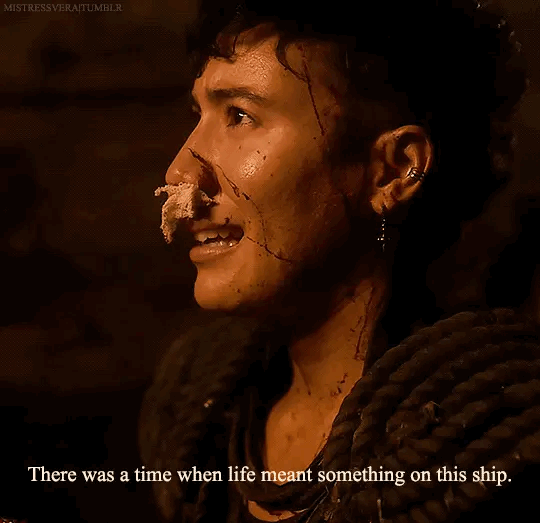
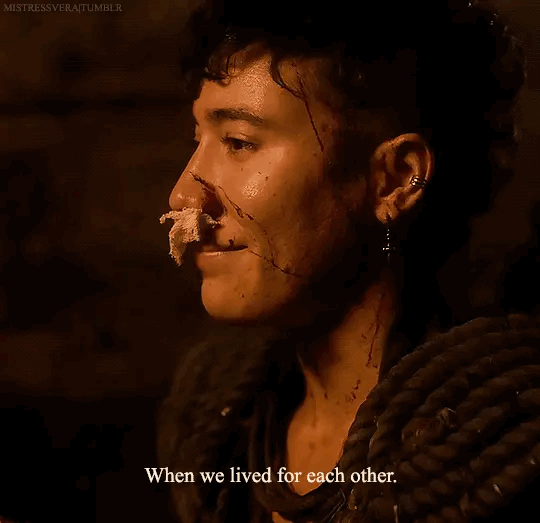
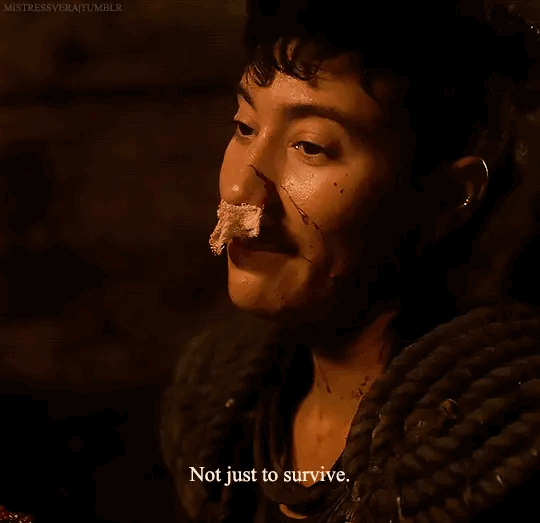
#jim jimenez#jim jimenez meta#ofmd#our flag means death#ofmd s2 spoilers#crew of the revenge#rope and nets#ofmd costuming#trust and security and honesty#god i love them#vico ortiz#david jenkins#characterization#costume analysis#character analysis#ofmd meta
479 notes
·
View notes